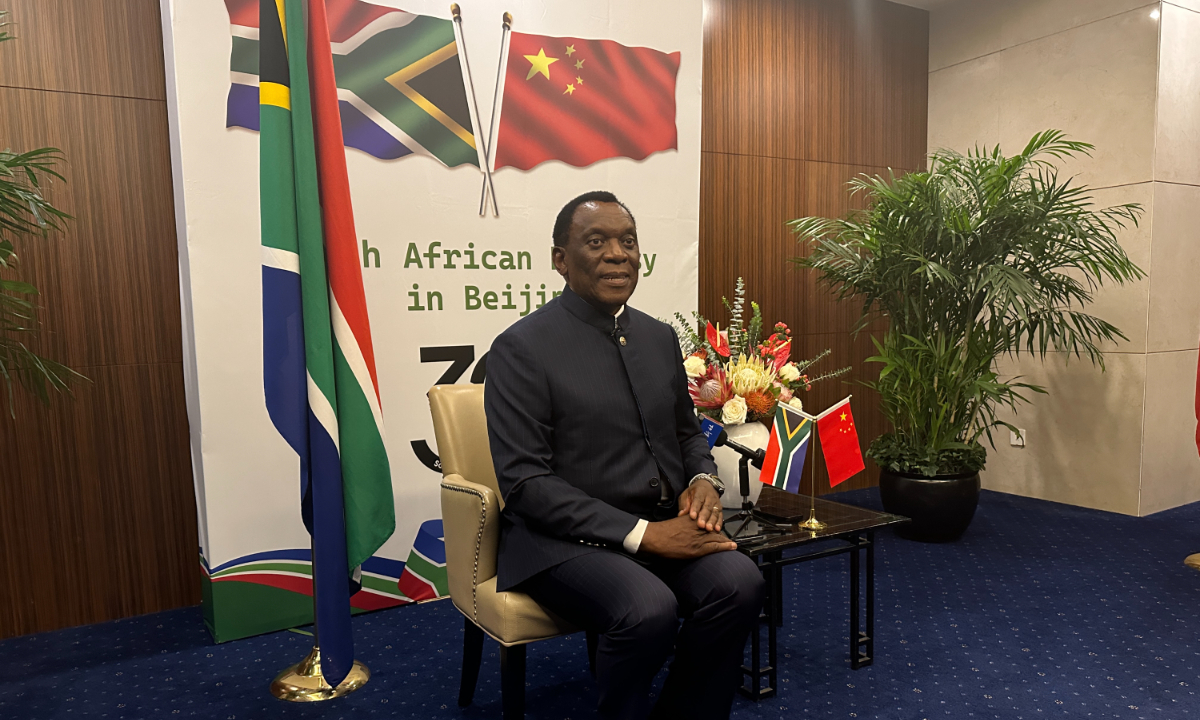
South African Ambassador to China Siyabonga Cyprian Cwele Photo: Xiong Xinyi/GT
The BRICS are advancing the progress of its common currency, while actively promoting the use of local currencies from member states to reduce the risks of solely relying on the US dollar, South African Ambassador to China Siyabonga Cyprian Cwele told the Global Times on Friday.
In an interview on the sidelines of a reception hosted by the South African embassy in China to mark the country's 30th anniversary of freedom, Cwele also spoke highly of China-South Africa bilateral ties and refuted slanders against China's cooperation with Africa.
Regarding the BRICS currency, the taskforce formed by the financial ministers of the member states will have a meeting in May to move corresponding discussions forward, with a focus on key issues including promoting greater stability of international monetary and financial systems, the South African envoy said.
Cwele stressed the importance of supporting the use of local currencies with open financial data sharing, while looking into digital currencies as ways to explore multiple and stable mechanisms for trade and settlement to reduce the risks such as sanction by just relying on a singular currency.
Amid the rapid development of technologies such as artificial intelligence, Cwele noted that the BRICS endorses technology, as adapting new technologies properly is beneficial for everyone.
When it comes to the BRICS expansion, Cwele highlighted the fruitful achievements realized during the BRICS Summit in 2023, which was held in Johannesburg, South Africa. BRICS leaders agreed at the summit to invite six countries, including Egypt, Ethiopia, Iran, Saudi Arabia and the United Arab Emirates, to join the group.
Cwele noted that over 20 countries had expressed an interest in joining the group as they saw the positive aspects of being a BRICS member, adding that the new members also represent significant economies across the world.
He said that the discussion of expansion is continuing, as senior officials are working to create guidelines that are non-discriminatory with cogent criteria covering different characters rather than just economic standards.
As 2024 marks the start of a new decade for the China-proposed Belt and Road Initiative (BRI), Cwele shone a spotlight on the already tangible cooperation on infrastructure, in addition to Chinese companies helping South Africa tackle energy challenges last year, foreseeing cooperation being further strengthened in coming years while aligning the BRI with the African Union 's 50-year continental development blueprint, Agenda 2063.
China has been instrumental in assisting connecting African countries, Cwele said, stressing that the construction of infrastructure has helped boost trade among African countries. He emphasized that slanders against China's cooperation with Africa such as "debt trap" are unfounded, as most African countries' debt do not come from China but elsewhere.
Meanwhile, China-South Africa bilateral exchange and cooperation have been continuously improving. China has remained South Africa's largest trading partner since 2009, while South Africa has been China's largest African trading partner since 2010. Official data showed that the bilateral trade grew from $1 billion in 1998 to $56 billion in 2023.




